He called them with the same magic that brings the fog in the morning or a thunderstorm on a hot summer afternoon. They came from the reservation. They came from hiding places deep in canyons or high in mountains. They came because he was the War Chief. and before they passed from the world, they wanted to go on one last raid. They were the moisture in the earth or the charge in the sky before a storm. They came because they wanted to be released.
At Fort Sill, he was forced to live in a canvas tent, because they would not allow him to build a wikiup. Many of the people had moved into poorly built houses that the Indian agents had provided for them. As if going tame would save them. As if it would let them forget how the white man had hunted them, driven them from their homes, crushed them in a war without honor or skill or bravery. Just a relentless press of men and weapons devoid of cunning.
No one would ever sing songs about how the cavalry defeated the Indians. It was a sad, shameful thing. But Goyaate knew that as long as men told tales of battle they would recount what he and his warriors had done. Still, they had lost. And now the tribes were learning to wear the white man’s clothes and sleep in the same ugly place for year after year. An Apache was meant to wander in mountains and his soul died when he didn't.
In twos and threes they had come, through the early spring. Braves he knew brought with them younger men he didn't. In this way had come Black Knife, Loco, Delgado, Coleto and Ponce. When they squatted they did not talk of the ones who did not come or the ones who would never raid again because they had ridden on into the unknown. They spoke of the weather and what they had heard from travelers, of the hope that the Buffalo would return and the knowledge that they would not.
Vittorio told him of a fine rifle he had hidden away from the soldiers and how good it was to hunt with. Little Delgatito complained about his wives. At the end, they all had the same question: when are we leaving? To them Goyaate said, “I think I will stay a little bit longer.”
To this each man answered. “Then I will stay a little longer too.” And by this, he knew they were with him.
Rumors spread among the people. But this was always the way with people who stay in one place. They grow weak and prone to gossip and other evils.
The rumors even made their way to Major Thomason. So he told Captain Evans, to go and speak with Goyaate and learn his mind. Captain Evans was eager. He had come west only after all the fighting was over, so he did not know who he was talking to. He had heard the stories about the man, but he did not believe them. No one who had not fought against Goyaate would believe them.
Goyaate squatted in the dirt in front of his tent, playing with stones beside a barely guttering fire. The Captain walked up to him, his freshly shined boots collecting flecks of dust and ash as he approached. He wasted no time on pleasantries and spoke his mind straight away. A good quality in a warrior, thought Goyaate.
"There are rumors that you are growing restless, sir. That you will attempt to raid.”
Goyaate shrugged and said, “People who live in houses have much time to talk." He swept up a handful of stones and began to lay them out in the dirt.
"We do not know each other, sir,” said Captain Evans, “There is no bond of friendship between us, but I do implore you, honor your agreement and stay put."
Goyaate said nothing, now arranging the stones in a circle around a few stones in the center. When he was done he swept the shape away with his hand again.
The Captain continued, “Have your people not suffered enough? What point to lead more young men to their death, sir?"
Goyaate now counted the stones out by three. There were 26 stones so there was a group of two left at the end. Goyaate shook his head and muttered disappointment.
"So you will not raid, sir? You give me your word?"
Goyaate looked up. The young man had ruined it by speaking too much. Goyaate stared at him a long, long time before he said, “It is not our way to be in such a hurry."
Captain Evans nodded and left, saying more empty and foolish words before he went. The Captain felt sad that the mighty warrior had been reduced to a foolish old man playing in the dirt.
When the major asked him what Goyaate was doing when the Captain found him the Evans replied, "playing with pebbles the way small children play with marbles. I found no fight in him, sir. In fact, I suspect that his mind might be going."
The Major nodded and dismissed the Captain.
Before returning to his billet, the Captain rode a half a mile out of his way and used his spyglass to check on what the old War Chief was doing. He saw that Goyaate still squatted on the ground and played with stones. Evans shut the telescope with a snap. He shook his head and wondered how one ignorant savage could've caused so much trouble for the governments of both United States and Mexico.
Next to his dying fire, Goyaate rearranged his stones again, but still he had two left over. Bad luck. Threes were strong magic, fours were even stronger, but twos… bad luck.
A new shadow fell across the stones. Goyaate looked up slowly and saw that it was Red Sleeve, an old man who had been chief of his own tribe of Apache. Now his tribe was scattered, mostly dead, and they were both prisoners here on a military reservation.
Goyaate looked at the old chief and thought, not for the first time, that it would have been kinder for the white man to have killed them all, and that they had left them to die here as the worst punishment of all.
It was said that when Ussen made the lands and the people that he made each land fit for each people, with climate and food and herbs to suit them so they could flourish. And that when you took a people from their land, as they had taken the Apache to this Oklahoma, the people would grow sick and weak. This had happened to all of the Apache here at Fort Sill, and the lines in Red Sleeve’s face now looked like they were cut there by a knife instead of old age
Red Sleeve squatted and said, “When you leave, I will go with you."
Goyaate said, “The warpath will be hard, and you are a great warrior grown old. Maybe it is better if you tend the fires and pass your stories on to the next generation.”
Red Sleeve laughed bitterly, “They have destroyed us. I think there will be no more Apache, only tame Indians, captive on the reservations." Then he tossed a small stone into the pile with the others. He said, "I think I will die soon but I do not think I will die here.” He looked at the bleak plain around with its ragged tents and clapboard shacks, “This is not a good place to die.”
Goyaate saw it then. Twenty-four stones, in six groups of four on the ground before him. There was power in it. He could see the stones as warriors on a raid, a flowing formation that would shift naturally to take advantage of every enemy weakness.
Goyaate said, "I have stayed long enough. We will leave tomorrow night, after the moon has set.”
---
The next night, Goyaate and his men, built two fires in a low place, out of the wind, that could not be seen from the Fort. They sang the old songs, danced the opening to war, even though many of them were stiff and old. Had there been any young Braves left they would have laughed at the old man creaking and slow. Some, like Red Sleeve, teetered more than turned, and none of them whirled as they raised their voices.
But if anyone who looked into the old man’s eyes, he would not have laughed. They had all traveled the sacred warpath and honored it with the blood of many foes.
Many times had Goyaate led them as War Chief and Goyaate had always come back. Many of those who had followed him had died. But all who died had found a good death. The old men knew there was no good death to be had on the reservation.
The dancing stopped and Goyaate spoke, barely loud enough to be heard over the wind and the crackling fire. He spoke of the unstoppable waves of the white man, that kept coming and coming and coming. Of their insatiable hunger that would not be satisfied even if they ate the world. Had they not killed all the Buffalo? Had they not defeated all the tribes? Would they not consume the land and all the water? And after that, would they not eat the sky and the stars and even Ussen himself. And then, when there was nothing left they would eat each other. Until the last white man, a creature of boundless appetite would sit all alone in the dark, gnawing on his own feet, until he ate himself up and the universe came to an end.
Against this enemy, this hunger, Goyaate said, there could be no victory. The men looked to Goyaate expecting to see their despair mirrored on his face. But the War Chief was smiling. Goyaate said, “We could run, like we would run to the United States when the Mexican army was too strong for us. And then later run back to Mexico when the United States was too strong. We could run like this in the days when they feared to cross the border to chase us. It was only when they worked together and there was no border that they were able to defeat us. But I know a border across which neither of them can chase us. A place beyond the reach of this hunger, this sickness.
“Where is this place?” the men asked, daring to hope again after long years. And Goyaate said, “I will show you.”
All of them wanted to believe in Goyaate so much that this answer was good enough for them. All of them, but one.
Red Sleeve was grateful for such a powerful War Chief, but he knew that much of his strong magic came from others' belief in his great name. He did not doubt Goyaate’s magic. He had seen bullets bounce off him. He had seen wounds that would have killed any other man result in mere injuries. But still.
Red Sleeve asked Goyaate where this border was and how they would cross it. Was it far to the north? Was there a river? And if not Mexicans, what people were on the other side? Because both Red Sleeve and Goyaate love to kill Mexicans most of all.
Goyaate said, “Do you remember when the Long-Nosed Star Chief? The first time the Army tried to make peace with us? We rode in, you and I, meaning to make treaty with them. They showed us into a tent filled with food and drink. And while we were waiting, many of us ate and drank. While outside the soldiers were setting up with rifles. You remember how happy Arispe was to be eating the sweets they had left?”
Red Sleeve nodded once.
“And how they shot into the tent with many rifles. All the others were killed, not in battle, but by cowards. Yet we escaped.”
Red Sleeve nodded again and said, “Because you cut a hole in the back of the tent and we crawled out.”
“No,” said Goyaate, “We escaped because they did not think such a thing was possible. And if they had not found that hole in the tent, they never would have thought to follow us.”
Red Sleeve didn’t like that Goyaate had dodged his question, so he said “Where is this border? I am tired of old stories.”
“What has the whole world become, but the white man’s tent? A place to gather the warriors together, so they can make us false promises and kill us?”
“But what can we do that we have not already done?”
“The world is the tent, old father, and I will cut a hole in the side that they will never find. We will escape and leave the world to them so we can go and try a better one.”
Red Sleeve nodded his head again. Goyaate was more skilled in war than any man he’d ever known. If Goyaate said such a thing, then it would be so. Even if Red Sleeve couldn’t see how.
When the dance was done they walked between the fires, painted their faces with ash and burned ends of branches and began the sacred raid.
—
Then they ran. They ran with heart and with fire and the excitement of being wild and free again. They ran through the night. First, running south until the lights from the Fort had disappeared, then east, out of the foothills and onto the Llano Estacado, the Staked Plain of Texas.
There were grasses here, but water was very scarce. The hidden ways of this sea of grass at once been known to the Apache, but the Comanche had driven them from this land and ruled it from horseback. The Comanche had held The Staked Plain against the white man for years.They had lured entire companies of cavalry to their death here.
And why would the cavalry not feel safe, at least at first? The Bluecoats had rifles that could shoot farther than any bow. And there seemed to be no place for a foe to hide on the desolate prairie. No rocks, no trees, no streams. Yet still, the cavalry died in herds.
It was only when the Army started setting fire to the prairie itself that the Comanche were forced to surrender.
This wide open space was not freedom. It was a trap. There were only a few ways to cross it, and these, only on horseback. And not to know the paths that led from water to water, and not to have a horse to travel them quickly enough was to have the sun and the wind wring the moisture from your body and jerk you, like beef, for the vultures.
There were those who thought the Staked Plain got its name because it was a place the where Indians staked men to the Earth to die. But that was for dimestore novels. A man without a horse here would die far, far worse than if he was nailed to the earth. Yet into this terrible, hopeless place Goyaate and his men ran with only the water they could carry with them.
They did not stop. They built no fire and they ate no food. Starvation was an old friend to those who had been on a reservation.
—
The Cavalry rode out after them two days after Goyaate had left. The scouts had laughed when they found the track. Running on foot into the Staked plain was suicide. They would ride them down in a day. And then the world would be rid of the last War Chief.
Captain Evans regretted that it had come to this. He had believed that he was building some rapport with Goyaate. As the son of a Presbyterian minister, Captain Evans was heartened by the good work that had been done converting many of the natives from their heathen religions. In Christ were all things possible. Even the notoriously bloodthirsty Chief of the Comanche, Quanah Parker, had converted and started wearing a suit of clothes instead of savage regalia.
When they mustered the Major had come out and addressed the troop. He reminded those who were too young to have fought the Indians before that Goyaate was a dangerous adversary and the perpetrator of many savage atrocities.
Captain Evans wondered if the speech was for him. But this was silly. If the Major had any doubts or misgivings, he would not have given him the command. The Major finished by saying, “The army should have killed those savages long ago. Go forth and redeem us from our procrastinations.”
The day was glorious, and as they rode out Captain Evans’ only wish was to be riding off on a more gallant errand against a more worthy adversary. Instead of riding off to kill some old men. Like much the young Captain had seen of duty, there was no glory in it, save the honor that accrued to one who faithfully and completely fulfilled an order.
The high spirits of the morning did not last into the afternoon. The track was plain and the Apache had made no effort to hide it, but after hours of hard riding, they still had failed to sight the fugitives.
They dismounted, fed, and watered the horses and then the men. This took the better part of an hour, and when they remounted, things got worse. After a quarter of an hour, they came to the end of the trail. The footprints through the long grass of the staked plane simply came to a stop. The Captain and several of the men scanned the horizon in all directions with spyglasses. But there was no sign. Scouts rode in widening circles around the main troop. They found nothing but the original trail.
"Well, they can't simply have just disappeared, or ran into the sky with the angels," said Captain.
"Devils," muttered a nearby trooper, with a note of fear in his voice.
Captain Evans dismissed this as mere superstition. He turned to O'Rourke, his dependable old sergeant, veteran of many a raid and campaign. He said, “All the superstitious nonsense, Sergeant. There must be a perfectly good explanation for this. Men don't simply vanish from the prairie."
To his surprise, O'Rourke crossed himself and said, “Not men, sir. This Goyaate is an evil man, sir, possessed of strong magic. Many times he should have died by now and many times he has survived."
"It is but a desperate trick. We make a camp here," he said looking at the sun dipping low in the sky. "Double the sentries, close packets, and tomorrow we put an end to this foolishness.”
They made camp but set no fires. The older men in the troop slept not at all. They sat, in twos and threes facing outward, rifles across their legs, not talking. They had ridden this plain before and remembered the men who had ridden with them and had not come back. Some stayed quiet because they could remember the bodies of men, women and children, that the Indians had and tortured for sport, leaving their entrails strung out in the prairie grass in strange patterns. Others did not speak because they could remember the horrible things *they* had done to the savages in the name of retaliation.
Captain Evans rose from his bedroll a little before dawn. He woke the cook and asked for coffee. Before the coffee had finished brewing a cry went up from one of the scouts. Captain Evans looked out in front of the company, past the place where the tracks had stopped. There was nothing. Then he saw that the scout was pointing East, back the way they had come.
There he saw a figure silhouetted against the sliver of the rising sun. He covered his eyes and stared painfully into the dawn trying to see who it was. But it was no use. He called for ten men to mount up. One of the lieutenants, as eager and fresh as the Captain had been just a few short years ago, asked him, “What is it, Sir?”
“We shall see soon enough, Mr. Jettle,” Captain Evans said in a dismissive tone. He ended the conversation by mounting his horse and shouting orders.
They formed up in a line and advanced East at a walking pace. When some of his men drew weapons, the Captain barked, “Holster arms!" Whatever this was, Evans wanted the man alive. So he could learn what had happened.
On this featureless plain information could be more valuable than water. As they drew closer Evans could see the figure was an old man, staggering around in a circle. Was he wounded? Was he injured? It did not appear so, but the old man moved with such trouble that the Captain felt sorry for him. Then he saw that this man was an Indian and his fear returned. He looked up and down the line. His men were all fixated on this old Indian. None of them were looking around. He eased his pistol from his holster.
The old man stumbled, and it seemed like he would fall. They were so close, why did the old man not look at them? Captain Evans cried out, “You there!"
The old Indian turned to face the cavalry. The red glow of dawn through his hair made it seem that he was soaked in blood, but the real horror was in the man's smile. Captain Evans realized he had never before seen an Indian smile on the reservation. The old man threw his head back and yipped three times like a coyote.
Captain Evans opened his mouth to say, "seize him!" But before he could get the words out, the prairie erupted all around them. Screaming natives clawed their way up through the turf as if out of their own graves. The horses bucked and plunged unpredictably as the Indians attacked, two or three to each horse. They pulled troopers from the saddle and dispatched them with knives. And as soon as a horse was vacated, an Indian would mount.
Captain Evans pointed his pistol, seeking a target in the chaos. He fired a shot at an Indian scalping one of his men on the ground, but the shot missed. He was knocked from his saddle. At the sound of the gunshot, all of the Indians on horseback wheeled and charged towards the cavalry encampment. Captain Evans inhaled to yell a warning, but before the words came out the old man grabbed his mouth with his left hand and drug a knife along the Captain’s neck with his right. Blood spurted all over the old man's knife arm. As the captain fell to the earth dying, the old man held his blade high in the sunrise, marveling at the red blood in the orange and red hues of the dawn. Once again Red Sleeve had earned his name.
With a single pass, the Indians stampeded the encampment’s horses. The younger men wanted to circle back and finish the job. But Goyaate rode on. Let the staked plain finish them. And one did survive, the news they brought to the other white men would arrive too late to be of use.
Goyaate rode straight for the heart of the emptiness, knowing that at the heart of nothing he would find everything he was after.


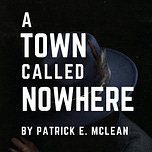



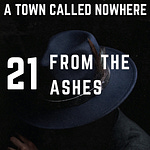
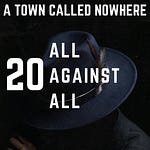
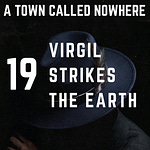


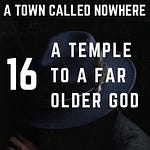

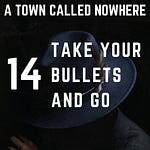
Share this post